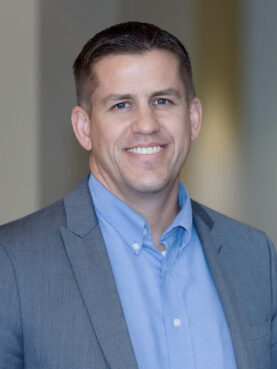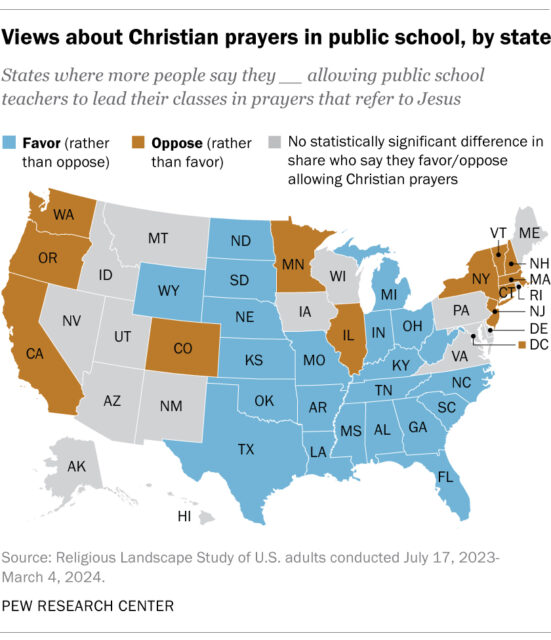(RNS) — A new Texas law mandating that schools set a time for students to pray will likely be popular with many residents of the Lone Star State.
A new report from the Washington, D.C.-based Pew Research Center found that 61% of adults in Texas say they approve of allowing teachers to lead Christian prayers in the classroom. That makes Texas one of 22 states where at least half of the population approves of such prayers, and one of 14 states, mostly in the South, where 60% of the population agrees.
Majorities in 12 states oppose teacher-led prayer. In 16 states, the population is split.
RELATED: 10 Commandments Must Be Displayed in Louisiana Classrooms by 2025
“Today, Americans are deeply split on the question of whether to allow Christian prayer in school,” the report says.
“Views about Christian prayers in public school, by state” (Graphic courtesy Pew Research Center)
That’s not stopping officials in states like Texas from pushing to allow more prayer in schools — although they are not mandating it be Christian.
On Saturday, Texas Governor Greg Abbott signed a law that requires schools to set aside time for students and staff to take part in voluntary prayer and Scripture reading. Under the law, school officials are required to “provide students and employees with an opportunity to participate in a period of prayer and reading of the Bible or other religious text on each school day.” The same law, however, also bars students and staff from participating unless they sign a consent form.
Abbott also signed a separate law requiring schools to display the Ten Commandments in classrooms. A federal appeals court recently ruled a similar law in Louisiana was unconstitutional.
Steven Collis, professor of law and director of the Bech-Loughlin First Amendment Center at the University of Texas at Austin, said the Texas law appears to have been written to avoid concerns about coerced prayers and other First Amendment restrictions. The law requires school districts to set up a time for prayer but bars students or school employees from participating unless they’ve signed a consent form, saying they understand the prayers would be voluntary. Any participant also must agree not to sue the school over prayer.
The bill also bans prayers over a public address system — as well as prayers or Bible readings where anyone who has not signed a consent form can hear them.

Steven Collis. (Courtesy photo)
“I think it’s clear to me the legislature drafted this in a way to try to account for current case law,” said Collis.
Collis said the law still will likely face challenges in court. What happens, he said, if 95% of the students get consent to take part in prayer — will the remaining students feel pressure to do so as well? Or if teachers end up leading prayers?
The law professor said much will depend on how the new law is implemented.
“To me, it’s not an obvious establishment clause violation under current case law,” he said.
Collis said he’s wary about public polling on prayer in school — saying that while folks may approve of prayer, they also likely only approve of some prayers.
“Everything comes down to how you’re defining the phrase prayer in schools,” he said. “Nobody wants anyone else’s prayers forced upon them.”
“No child should be pressured to perform piety to feel safe or accepted in a public school classroom,” Fierro-Pérez said in a statement after the bill was signed into law. “No teacher should have to referee prayer. And no family should have to fear that their beliefs will be marginalized by the institutions meant to educate their children.”


